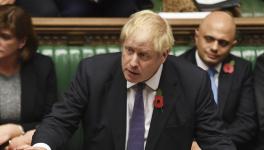Brexit: What Happens Now?
Boris Johnson had lost a vote on an amendment passed by the opposition and Tory rebels on Saturday. (Photo: PRU/AFP)
The British House of Commons will discuss the Withdrawal Agreement Bill which gives legal status to Brexit on Tuesday, October 22. This is following the refusal of the Speaker of the House of Commons, John Bercow, to permit a vote on prime minister Boris Johnson’s Brexit deal on Monday. Bercow made this decision based on the fact that the circumstances had not changed since Saturday when the House of Commons considered the deal.
On that day, instead of voting on the deal, parliament passed an amendment moved by rebel Tory MP Oliver Letwin, refusing approval to the deal unless the accompanying Withdrawal Agreement Bill was also passed. As Johnson could not get his version of the deal passed on Saturday, the Benn Amendment was triggered. This amendment stated that if the Brexit deal was not approved by parliament by October 19, a request for an extension would be sent to the European Union.
Following this Johnson grudgingly sent a letter to the the European Commission, seeking an extension of the Brexit deadline from October 31 to January 31, 2020. However, he sent it without attaching his signature. He also sent a second signed letter stating the objections of his government to any further extension, and even asking the European leadership to disregard the extension request. The opposition Labor party and other politicians condemned the move. The EU authorities have said they are considering the letter
There is still the possibility that Boris Johnson can pass the necessary legislature by October 31. However, he faces a number of obstacles. The House of Commons will first consider whether to pass the Withdrawal Agreement Bill at an accelerated timeline of three days. Many MPs have expressed concerns at a number of aspects of the Bill, including labor rights. Certain MPs are trying to introduce amendments to the bill for provisions such as a closer customs union with the European Union and even a second referendum.
The question of Johnson getting the necessary numbers also remains. It is unclear how the Democratic Unionist Party, a key ally of the Conservatives, will vote. The DUP had opposed the deal proposed by Boris Johnson on the grounds that it allowed for Northern Ireland to remain closely linked with the EU. The other key group whose votes could prove vital are erstwhile Tory rebels. Many of them seem inclined to support the bill.
The opposition Labour Party is keen on an election once the Brexit deadline is delayed, as are the Liberal Democrats. They are hoping for Boris Johnson to be overthrown and a fresh deal negotiated. Labour recently decided that its version of the deal would be voted on in a second referendum which would also give people the option of voting to remain in the EU.
Get the latest reports & analysis with people's perspective on Protests, movements & deep analytical videos, discussions of the current affairs in your Telegram app. Subscribe to NewsClick's Telegram channel & get Real-Time updates on stories, as they get published on our website.
























